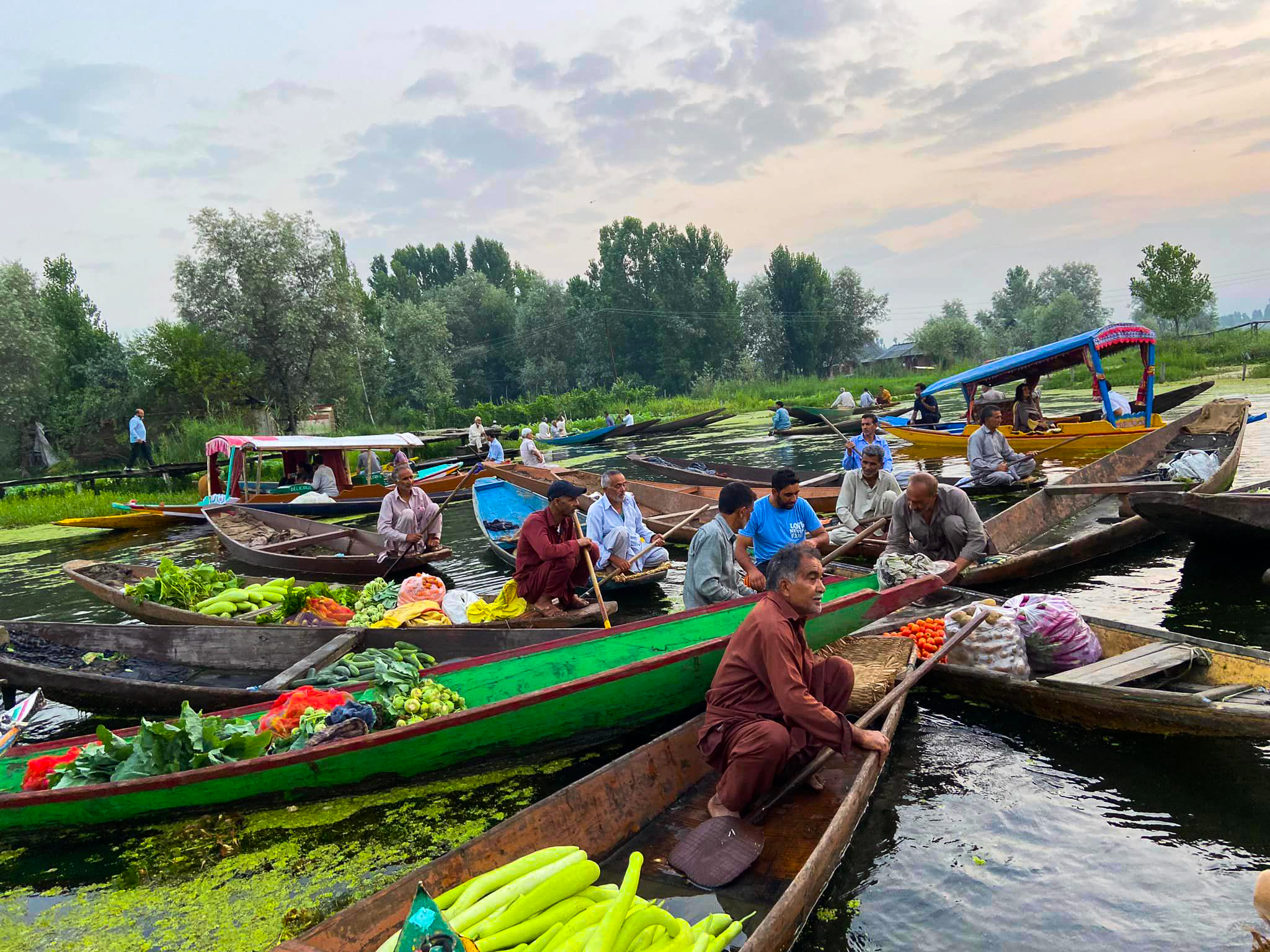The Dal Lake in Srinagar is a mini world of its own. A vast body of water, especially when seen with the adjoining Nigeen Lake, Dal Lake covers an area of more than 22 square kilometers. On clear days, it is truly spectacular as its mirror-like surface reflects the intricately carved wooden houseboats, colourful shikaras, rugged Pir Panjal mountains, and trees. In autumn, the red-gold foliage of the chinars is absolutely stunning and add to that the vast blue sky and the maze of human habitats that crisscross these lakes. As I said, Dal Lake of Srinagar is a self-contained world and they even grow their own vegetables. In fact, most of Srinagar´s fresh produce comes from there and the floating vegetable market is a huge draw amongst both the tourists and the locals. The tourists go there to experience something unique and the locals go there to procure the freshest vegetables at the most competitive prices. 
Table of Contents
The floating market experience
These vegetables come from the many floating gardens that dot the Dal and Nigeen lakes of Srinagar. Locally known as Rad, these mini plantations thrive on a mix of matted vegetation and earth, and produce some superb veggies like tomatoes and cucumbers. These vegetable gardens belong to private owners and every morning, you can see them or their agents, rowing shikaras laden with leafy greens, water chestnuts, ´nadru´ (lotus stems), onions, tomatoes, and cucumbers to sell to the wholesalers. These buyers in return sell them to various shops on land or cart them to the sabji bazar (vegetable market) for early morning business. The market mainly focuses on wholesale transactions and most of the trade is done by 7 am. Nowadays owing to the huge tourist interest, there are more flower, kahwa (local saffron tea), and sweetmeat sellers than the veggie vendors. However, they simply add to the charm of the experience. If you are lucky, you might catch sight of the local baker who sells freshly baked Tsot (Kashmiri breakfast bread) from canal to canal. He comes with a loaded shikara and calls out before entering an area. His calls act like magic and soon you can see the Kashmiri housewives in their colourful pherans standing on the bank waiting for their quota of breakfast staples. I liked the experience of the floating market in Srinagar even though it was slightly expensive. It was interesting, colourful, and I loved to see the locals bargaining while simultaneously rowing their shikaras. But, is it an experience worth paying so much? Take a look at this photo essay of the Srinagar floating market and decide for yourself.

Fresh produce being rowed on shikaras
Srinagar Floating Market Travel Tips
Srinagar floating market is an unorganized market. Here sellers gather in colourful wooden boats in the middle of the lake at the crack of dawn to sell their fresh produce. Most of these vegetables are procured from the floating gardens of Dal Lake. Since it is difficult to find without local knowledge, either ask your hotel to organize it for you or hire a shikara from Nehru Park jetty. A ninety-minute round trip from Nehru Park jetty to the floating market is around 1000 Rs (12 Euros). Book ahead as these shikaras leave the jetty around 05;30 a.m. Don´t miss the birdwatching on your way back.

Look at the oppulently carved interiors of the houseboat where I stayed

The terrace

View from my bedroom

On my way on a shikara to the floating market


A houseboat workshop in Srinagar














Follow the rest of the Kashmir series
- 21 PHOTOS THAT MAY TEMPT YOU TO VISIT KASHMIR
- DAKSUM, THE HIDDEN JEWEL OF KASHMIR
- APPLE FLOWERS AND KOKERNAG SPRING
- YOUSMARG: THE MEADOWS ON WHICH JESUS WALKED
- A SAFFRON AUTUMN IN PAMPORE
- WINTER IN KASHMIR
- GUIDE TO A WHITE GULMARG WINTER
- BEAUTY OF GUREZ IN AUTUMN
- SRINAGAR TULIP FESTIVAL
- LIFE ON SRINAGAR LAKES
- BLOOMING ALMOND TREES AT BADAMWARI
- WALIMA, A KASHMIRI WAZWAN WEDDING FEAST
- THE MOUTH WATERING KASHMIRI CUISINE
- FAMILY FRIENDLY KASHMIR ITINERARY
- OFFBEAT KASHMIR ITINERARY IDEAS
- SRINAGAR MUGHAL GARDENS
RESPONSIBLE TRAVELING-BECAUSE I CARE

